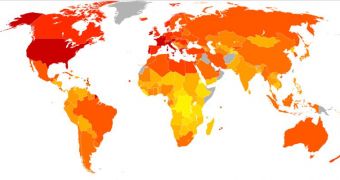Modern lifestyle is causing the internal clocks governing our bodies to become out of sync with everyday realities. This condition, known as social jetlag, may be an important factor contributing to the spread of the obesity epidemic currently sweeping through the developed world.
Countries such as the United States, the United Kingdom, France and Italy consistently occupy the first positions in a top establishing which nation consumes the most kilocalories per person daily.
As such, it's no wonder that these are also the nations plagued by sweeping obesity epidemics. In the US, 2 out of 3 citizens are overweight, and 1 in 3 meets the medical definition of obesity. Authorities are struggling to contain this issue, but they are fighting a losing battle.
In parallel with conducting efforts meant to make people understand that moderation is key to a healthy lifestyle, scientists are also trying to discover the biological, medical, social and economic bases of obesity, PsychCentral reports.
German investigators at the University of Munich, led by expert Till Roenneberg, say that social jetlag is a syndrome plaguing modern society, and that has yet to be recognized as such, until now.
““It concerns an increasing discrepancy between the daily timing of the physiological clock and the social clock. As a result of this social jetlag, people are chronically sleep-deprived,” the expert says.
“They are also more likely to smoke and drink more alcohol and caffeine. Now, we show that social jetlag also contributes to obesity – the plot that social jetlag is really bad for our health is thickening,” Roenneberg goes on to say.
Daylight and darkness are the natural factors that influence our circadian rhythms, the clocks within our bodies that dictate which hormones are released at what time, the speed at which our organs work, what our metabolism should be at any given time, and so on.
Since the optimal window for sleep is between nightfall and morning, this is when these natural clocks put our bodies in sleep mode. Nowadays, we listen to these signals “less and less due to the increasing discrepancy between what the body clock tells us and what the boss tells us,” Roenneberg argues.
He and his team have been compiling a map of human sleeping and waking behaviors for the better part of a decade. The massive dataset already comprises a wealth of information, including participants' height, weight, and sleep patterns.
“Waking up with an alarm clock is a relatively new facet of our lives. It simply means that we haven’t slept enough and this is the reason why we are chronically tired,” Roenneberg adds.
“Good sleep and enough sleep is not a waste of time but a guarantee for better work performance and more fun with friends and family during off-work times,” he concludes.

 14 DAY TRIAL //
14 DAY TRIAL //